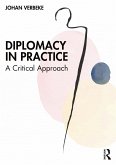This book informs students about the practice of modern diplomacy while simultaneously inviting them to critically reflect on it. The work introduces the world of diplomacy from a practitioner's point of view. Rather than listening to what diplomats say they do, the book looks at what they actually do. Diplomacy is thus approached through the lenses of its manifold practices: from political analysis to policy-shaping, from conflict prevention over conflict-management to conflict-resolution. However, the book not only aims at informing or instructing but also, and primarily, wants its readers to critically reflect on diplomacy. It reviews received ideas by posing questions such as: what does 'preventive diplomacy' really mean?; what is the place of 'transparency' in diplomatic practice?; why is the relationship between 'law and diplomacy' ambiguous?; how come that our leaders have such a difficult time in credibly defending 'human rights'?; and why is conducting an 'ethical foreign policy' a mission impossible? To tackle these and other questions, the book uses the tools of contemporary academic disciplines, such as behavioural economics, game theory, social psychology, argumentation theory, and practical logic, among others. This interdisciplinary approach brings fresh perspective to a field of study that has long remained self-contained. This book will be of great interest to students of diplomacy, foreign policy, and International Relations, as well as those seeking a career in diplomacy and existing diplomatic practitioners and international analysts.
Hinweis: Dieser Artikel kann nur an eine deutsche Lieferadresse ausgeliefert werden.
Hinweis: Dieser Artikel kann nur an eine deutsche Lieferadresse ausgeliefert werden.
'Who better to shed light on the complex and much misunderstood and misrepresented subject of the practice of diplomacy than Johan Verbeke, whose time on the UN Security Council and subsequent service as the Special Representative of the UN Secretary General together with his period as Belgium's ambassador in London provide a solid foundation for this valuable book? He understands and explains why diplomacy is not, and cannot be, a matter of drawing up blueprints, but rather of adapting to events and attempting to shape their handling. And he explains too why diplomacy is as essential as ever in this digital age with which diplomats have to come to terms.'
David Hannay, former UK Permanent Representative to the EU and UN, and former member of Kofi Annan's High Level Panel on Threats, Challenges and Change'
'By focusing on ''diplomacy in practice'', Johan Verbeke offers a much-needed reality check: what can diplomacy do, and how to ensure that it is successful? But also, what can diplomacy not do, what are its limits? A highly successful national and UN diplomat himself, his sharp analysis goes straight to the heart of the matter.'
Sven Biscop, Director of Programs at Egmont - the Royal Institute for International Relations in Brussels and Professor at Ghent University
'Johan Verbeke's Diplomacy in Practice strikes by its novel approach to an old subject. Coming from a great practitioner with a solid academic background, the book not only offers an understanding of what diplomacy as a practice really comes down to, but also invites the reader to critically reflect on it. For that the book's interdisciplinary approach proves invaluable. There is clarity and boldness of thought in this book and that is what makes it indispensable reading for students of diplomacy and professional diplomats alike.'
Peter Piot, Special Advisor to the EU Commission President, former Director of the London School of Hygiene and Tropical Medicine and former Executive Director of UNAIDS
'The publication of Johan Verbeke's Diplomacy in Practice could not be better timed. The art, as much as the practice of diplomacy, has appeared to be slipping to the margins of international politics, as parliaments, non-state actors, business leaders and prime ministers competed over the domestic impacts of globalisation. But China's rise, America's decline, Russia's determination to regain its status, and the emergence of new regional powers have together brought diplomacy back to the centre of statecraft for large, small and mid-sized countries alike. In this book, Verbeke provides both a conceptual framework and a set of practical guideposts for the practice of modern diplomacy, thereby ensuring that a new generation of diplomats, policymakers and analysts can benefit from the insights of one of Europe's most seasoned and thoughtful diplomats.'
Robin Niblett, Director and Chief Executive of Chatham House
'This book by my former Chief of Staff is timely. The new era of great power competition we are entering in will need a lot of diplomacy: producing the right analysis, formulating and finetuning the politician's decisions, doing the after-care. Johan Verbeke is overly humble to limit himself to a practitioner. His broad knowledge of history and context make him a scholar drenched in practice.'
Karel De Gucht, former Belgian Minister of Foreign Affairs and EU Trade Commissioner
'Stripped of smokes and mirrors, away from pomp and circumstance, this book gives a clear toolkit for the daily practice of diplomacy in the 21st century.'
Stefan Dercon, Professor of Economic Policy, University of Oxford, UK
'It should be mandatory reading for any aspiring diplomat, but it will also be read with profit by seasoned diplomats who want to take a fresh look at their trade, and indeed by anybody who is interested in international relations. The book contains many lessons for people working in the EU institutions, even those who do not directly work in the diplomatic area.'
Jim Cloos, Egmont Royal Institute for International Relations Book Reviews
David Hannay, former UK Permanent Representative to the EU and UN, and former member of Kofi Annan's High Level Panel on Threats, Challenges and Change'
'By focusing on ''diplomacy in practice'', Johan Verbeke offers a much-needed reality check: what can diplomacy do, and how to ensure that it is successful? But also, what can diplomacy not do, what are its limits? A highly successful national and UN diplomat himself, his sharp analysis goes straight to the heart of the matter.'
Sven Biscop, Director of Programs at Egmont - the Royal Institute for International Relations in Brussels and Professor at Ghent University
'Johan Verbeke's Diplomacy in Practice strikes by its novel approach to an old subject. Coming from a great practitioner with a solid academic background, the book not only offers an understanding of what diplomacy as a practice really comes down to, but also invites the reader to critically reflect on it. For that the book's interdisciplinary approach proves invaluable. There is clarity and boldness of thought in this book and that is what makes it indispensable reading for students of diplomacy and professional diplomats alike.'
Peter Piot, Special Advisor to the EU Commission President, former Director of the London School of Hygiene and Tropical Medicine and former Executive Director of UNAIDS
'The publication of Johan Verbeke's Diplomacy in Practice could not be better timed. The art, as much as the practice of diplomacy, has appeared to be slipping to the margins of international politics, as parliaments, non-state actors, business leaders and prime ministers competed over the domestic impacts of globalisation. But China's rise, America's decline, Russia's determination to regain its status, and the emergence of new regional powers have together brought diplomacy back to the centre of statecraft for large, small and mid-sized countries alike. In this book, Verbeke provides both a conceptual framework and a set of practical guideposts for the practice of modern diplomacy, thereby ensuring that a new generation of diplomats, policymakers and analysts can benefit from the insights of one of Europe's most seasoned and thoughtful diplomats.'
Robin Niblett, Director and Chief Executive of Chatham House
'This book by my former Chief of Staff is timely. The new era of great power competition we are entering in will need a lot of diplomacy: producing the right analysis, formulating and finetuning the politician's decisions, doing the after-care. Johan Verbeke is overly humble to limit himself to a practitioner. His broad knowledge of history and context make him a scholar drenched in practice.'
Karel De Gucht, former Belgian Minister of Foreign Affairs and EU Trade Commissioner
'Stripped of smokes and mirrors, away from pomp and circumstance, this book gives a clear toolkit for the daily practice of diplomacy in the 21st century.'
Stefan Dercon, Professor of Economic Policy, University of Oxford, UK
'It should be mandatory reading for any aspiring diplomat, but it will also be read with profit by seasoned diplomats who want to take a fresh look at their trade, and indeed by anybody who is interested in international relations. The book contains many lessons for people working in the EU institutions, even those who do not directly work in the diplomatic area.'
Jim Cloos, Egmont Royal Institute for International Relations Book Reviews









